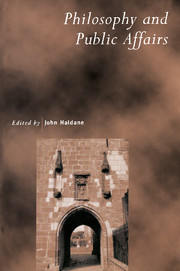Book contents
- Frontmatter
- Contents
- Notes on Contributors
- Introduction
- In Defence of Individualism
- Market Boundaries and Human Goods
- A Tale of Three Karls: Marx, Popper, Polanyi and Post-Socialist Europe
- Liberty's Hollow Triumph
- Politics, Religion, and National Identity
- Contemporary Art, Democracy, and the State
- Popular Culture and Public Affairs
- Welfare and the State
- Questions of Begging
- Philosophy and Educational Policy
- What did John Dewey Want?
- Educating for Citizenship
- Being Human: Science, Knowledge and Virtue
- Index
Being Human: Science, Knowledge and Virtue
Published online by Cambridge University Press: 20 May 2010
- Frontmatter
- Contents
- Notes on Contributors
- Introduction
- In Defence of Individualism
- Market Boundaries and Human Goods
- A Tale of Three Karls: Marx, Popper, Polanyi and Post-Socialist Europe
- Liberty's Hollow Triumph
- Politics, Religion, and National Identity
- Contemporary Art, Democracy, and the State
- Popular Culture and Public Affairs
- Welfare and the State
- Questions of Begging
- Philosophy and Educational Policy
- What did John Dewey Want?
- Educating for Citizenship
- Being Human: Science, Knowledge and Virtue
- Index
Summary
In February 1997, following the announcement that the Roslin Institute in Scotland had successfully cloned a sheep (‘Dolly’) by means of cell-nuclear transfer, US President Clinton requested the National Bioethics Advisory Commission to review legal and ethical issues of cloning and to recommend federal actions to prevent abuse. In the meantime he directed the heads of executive departments and agencies not to allocate federal funds for ‘cloning human beings’. The Commission consulted with members of relevant academic disciplines and other professions, representatives of interest groups and members of the general public, and received written submissions. Unsurprisingly, given the prospect of human cloning and the sensational announcement in January 1998 by the American physicist-cum-embryologist Richard Seed that he would aim to clone himself (subsequently he has decided that his wife would be a better subject), public debate in the US has been fairly voluble.
In Britain a similar consultation exercise has been engaged in by a joint working party of the Human Fertilisation and Embryology Authority and the Human Genetics Advisory Commission, established (in the same month as the US President's request to the NBAC) to advise government on human cloning issues. This reported in December 1998 and like the National Bioethics Advisory Commission has cautioned against the non-therapeutic (reproductive) cloning of human beings. Howard Shapiro, Chairman of the NBAC recommended to President Clinton a three to five year period of study and reflection before the preparation of a code of ethics on human cloning.
- Type
- Chapter
- Information
- Philosophy and Public Affairs , pp. 189 - 202Publisher: Cambridge University PressPrint publication year: 2000
- 2
- Cited by

